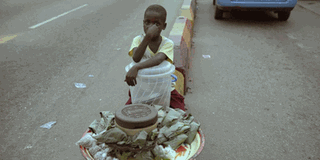Nigeria’s police give travel ban for election day

A child sits on the pavement along the road at night to hawk his wares in Akure, Ondo State in southwestern Nigeria, on March 24, 2015. Some 10.5 million children in Africa's most populous nation and leading economy are out of school -- the largest number in the world, according to the United Nations. AFP PHOTO
What you need to know:
- Meanwhile, here are five key battleground areas where the outcome could tip the result in favour of President Goodluck Jonathan’s People’s Democratic Party (PDP) or the opposition All Progressives Congress (APC), led by ex-military ruler Muhammadu Buhari.
- Kano: Mr Buhari won Nigeria’s second most populous state in 2011 by more than one million votes but will need to make gains in Kano to beat Jonathan nationally, after losing to the president by more than 10 million votes four years ago.
- Governor Rabiu Kwankwaso defected from the PDP to the APC last year, meaning the state government machinery will for the first time be aiding the opposition.
ABUJA, Wednesday
Nigeria’s federal police chief yesterday ordered restrictions on movement on election day this weekend, as the country goes to the polls to choose a new president and parliament.
Police said there would be a “total restriction” of vehicles between 8am (0700 GMT), when polling stations open, and 5 pm.
Ambulances, fire service trucks and others on “essential duties” would be exempt, the Inspector General of Police, Suleiman Abba, said in a statement.
Travel restrictions are routinely put in place for elections in Nigeria, where politically-linked violence by roaming gangs of hired thugs has been common.
Mr Abba said the measures were designed to “ensure adequate security” in Saturday’s vote, in which President Goodluck Jonathan is hoping to win a second term of office.
Identical restrictions will be put in place on April 11 for gubernatorial and state assembly polls, he added.
Security has been a major concern for the general election, with Nigeria’s electoral commission forced to postpone a vote scheduled for February 14 because of the deadly Boko Haram insurgency.
The decision was made after the country’s national security advisor said soldiers deployed on operations to fight the Islamist militants would be unable to provide security if required.
Claimed military successes against the Islamist rebels over the last month have raised fears that they will revert to suicide attacks and bombings, including at polling stations.
“Adequate security logistics and manpower have been strategically deployed to achieve a most conducive electioneering atmosphere,” Mr Abba said.
KEY BATTLEGROUNDS
“Policemen for election duty have been properly trained, briefed and sensitised on their roles,” he added.
Meanwhile, here are five key battleground areas where the outcome could tip the result in favour of President Goodluck Jonathan’s People’s Democratic Party (PDP) or the opposition All Progressives Congress (APC), led by ex-military ruler Muhammadu Buhari.
Lagos, in the southwest, is the largest city in sub-Saharan Africa with an estimated population of 20 million and has 5.8 million registered voters.
The city’s government has been controlled by the opposition since military rule ended in 1999. But the PDP has performed well in Lagos in past presidential elections and President Jonathan will need some support in the city to secure re-election.
Kano: Mr Buhari won Nigeria’s second most populous state in 2011 by more than one million votes but will need to make gains in Kano to beat Jonathan nationally, after losing to the president by more than 10 million votes four years ago.
Buhari is from neighbouring Katsina state and his popularity has grown in the north over the last four years, with the region desperately wanting to retake the presidency from the mainly Christian south.
One factor is likely to help Buhari among Kano’s five million voters:
Governor Rabiu Kwankwaso defected from the PDP to the APC last year, meaning the state government machinery will for the first time be aiding the opposition.
Ex-Kano governor Ibrahim Shekarau — who has since joined the PDP — was one of several opposition presidential candidates in 2011 and received more than 526,000 votes. (AFP)




